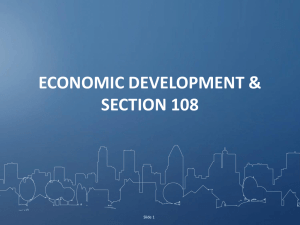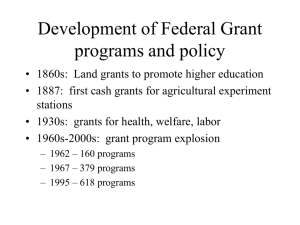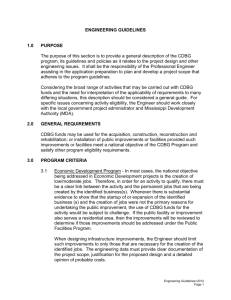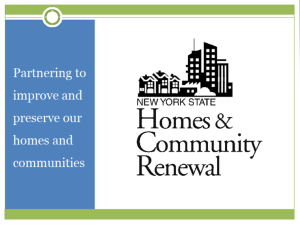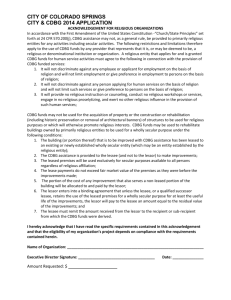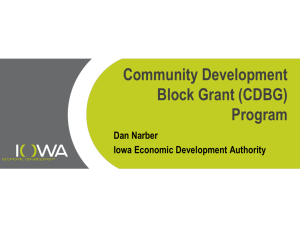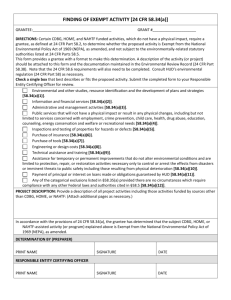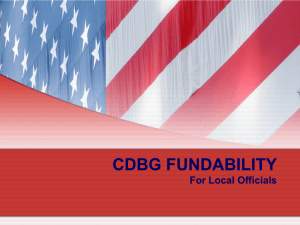CDBG Project Keys
advertisement
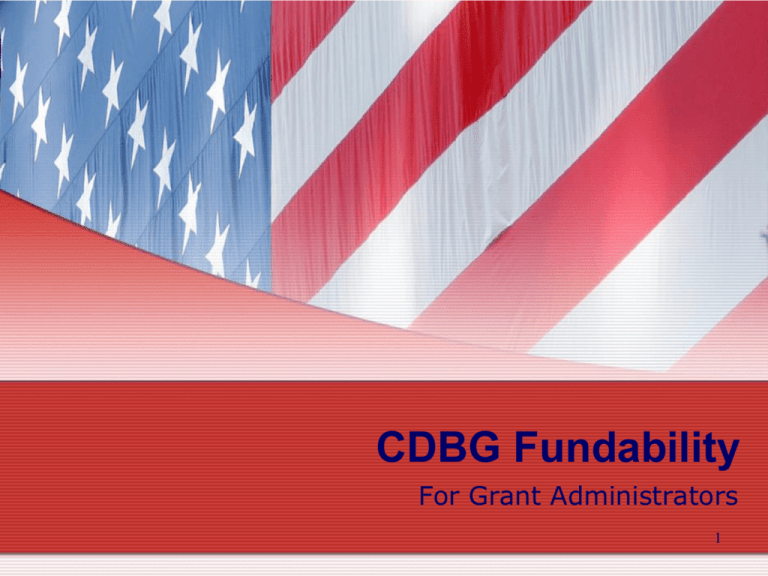
CDBG Fundability For Grant Administrators 1 CDBG Fundability • The objective of this module is to provide CDBG grant administrators with a basic overview and understanding of the key threshold measurement test, which determines whether or not CDBG Program funds are invested in community development projects 2 CDBG: Applicable Laws and Regulations • Housing and Community Development Act (HCDA) of 1974 • Code of Federal Regulations (CFR) Title 24 Part 570-Community Development Block Grant (CDBG) • CDBG Policy Guidance 3 Housing and Community Development Act (HCDA) of 1974 • The Housing and Community Development Act, as amended in 1981, created the CDBG program, a flexible block grant distributed annually to states and local governments mostly by formula. • Grantees determine which activities they will fund as long as each activity is eligible, and will meet one of the three national objectives of the program. 4 CDBG Regulations • Subpart I—State Community Development Block Grant Program SOURCE: 57 Federal Register, 53397, Nov. 9, 1992, unless otherwise noted. Title 24 Code of Federal Regulations (CFR) Section 570.480l 5 CDBG Policy Guidance---Memoranda • The policy guidance provided by HUD is based on the policy question and circumstances presented at the time. • HUD issues general guidance and makes no representation that the content is appropriate or authorized for use by all jurisdictions receiving Community Development Block Grant (CDBG) funding. 6 What is Fundability? • Fundability refers to key thresholds that determine the allowability of projects and programs to receive CDBG funding • The state review process for all local government CDBG funding applications must include a fundability determination prior to award. • All activities must be eligible for funding and meet a national objective 7 CDBG Program Fundability • The HCD Act requires that the State demonstrate it has undertaken a two-step process (HUD Handbook 6509.2 Rev-5) Step 1. Step 2. At the time of approval (award), determine that each proposed activity meets a national objective and is eligible Following implementation (project completion), determine activities carried out met national objective and same eligible activities as originally approved 8 CDBG National Objectives • The HCD Act requires that CDBG-funded activities meet one of the following three national objectives: – Benefit low and moderate income (LMI) persons. – Aid in the prevention or elimination of slums and blight (SB) – Meet urgent community development needs (UN) that the unit of local government is not able to fund either on its own or through other sources 9 MEETING A NATIONAL OBJECTIVE National Objective Low/Mod Area Benefit Slum/Blig ht Area Basis Urgent Need Spot Basis Limited Clientele Housing Jobs 10 National Objective: Low and Moderate Income Benefit • Area Benefit (LMA) – 24 CFR 570.483(b)(1) …persons • Limited Clientele (LMC) – 24 CFR 570.483(b)(2) …persons • Housing (LMH) – 24 CFR 570.483(b)(3) …households • Job Creation/Retention (LMJ) – 24 CFR 570.483(b)(4) …persons 11 MEETING A NATIONAL OBJECTIVE National Objective Low/Mod Area Benefit Slum/Blig ht Area Basis Urgent Need Spot Basis Limited Clientele Housing Jobs 12 Area Benefit (LMA) • Activity benefits available to all residents in a particular area (see 24 CFR 570.483(b)(1)) – Must be the entire area served by activity – At least 51% of area residents must be LMI – LMI documentation for 51% or greater by HUD provided data---Census data/LMI levels or Income survey data (HUD Notice CPD-05-06) – Area served must be primarily residential – Local applicant defines service area and state provides approval 13 Area Benefit (LMA) continued • For a public improvement activity that benefits all area residents, CDBG funding is limited to paying special assessments levied against residential properties owned and occupied by LMI persons. 14 Limited Clientele (LMC) • Activity may benefit a limited clientele, at least 51% of which are LMI persons (24 CFR 570.483(b)(2) • Activity may benefit at least one category of generally presumed principally LMI persons • Projects that benefit a limited clientele include: – senior centers – public services for the homeless – job training services for the disabled 15 Limited Clientele (LMC) continued • Documentation required for limited clientele activities includes: – Information on family size and income to document that at least 51% of clientele families are LMI (e.g., day care, health clinics) – Income eligibility requirements limit activity to LMI persons (day care, public services) – Location and nature of activity primarily serves LMI persons (community/youth center for public housing) 16 Limited Clientele (LMC) continued • Removal of materials and architectural barriers to improve accessibility/mobility of elderly and severely disabled adults by assisting: – reconstruction of public facilities – rehabilitation of privately owned nonresidential buildings – Rehabilitation of common area of residential structure with more than one dwelling unit 17 Limited Clientele (LMC) continued • Microenterprise assistance for LMI owners and persons developing microenterprises • Job Training and employment support services 18 Housing (LMH) • Providing or improving permanent residential structures, completed and occupied by LMI households (24 CFR 570.483(b)(3) • Only LMI test that must be met by households • Units must meet requirements: – single family structures – two or more units at least 51% units occupied by LMI households – rental housing must be occupied by LMI households at affordable rents 19 Job Creation/Retention (LMJ) • Create jobs - at least 51% of jobs must employ LMI persons, computed on full-time equivalent basis (24 CFR 570.483(b)(4) • Retain jobs- document jobs lost without CDBG assistance, at least 51% of which must be LMI based on who they are held by or reasonable turnover of jobs over 2 years • Available to LMI persons- business provides training for unskilled and first consideration for LMI persons 20 Job Creation/Retention (LMJ) continued • General rule: each assisted for-profit business considered a separate activity except for: – acquiring real property, a business incubator or an industrial park – providing technical assistance to businesses; or – public facilities or improvements that benefit more than one business (with some exceptions, see CFR 570.483(b)(4)) In these and other cases, must aggregate all jobs created or 21 retained by benefiting businesses MEETING A NATIONAL OBJECTIVE National Objective Low/Mod Area Benefit Slum/Blig ht Area Basis Urgent Need Spot Basis Limited Clientele Housing Jobs 22 National Objective: Prevention or Elimination of Slums or Blight • Activities must meet one of two determinations: – Area Basis---clearly eliminating objectively determinable signs of slums or blight in a defined area. 24 CFR 570.483(c)(1) – Spot Basis---strictly limited to eliminating specific instances of blight outside such an area. 24 CFR 570.483(c)(2) 23 Slum Blight-Area Basis Criteria • Area must be officially delineated by the local government and must meet a definition of slum, blighted, deteriorated or deteriorating area under state or local law. AND 24 Slum and Blight – Area Basis Criteria • Area meets the following provisions – At least 25% of properties in area experience one or more of the following: Physical deterioration of building or improvements Abandonment of properties Chronic high turnover or vacancy rates in commercial or industrial buildings Significant declines in property values or abnormally low property values Known or suspected environmental contamination OR - Area public improvements are deteriorated 25 Slum Blight-Area Basis continued • Documentation: – Define the boundaries of the delineated area – Identify all building and public improvement conditions demonstrating blight – Describe activity addressing the condition that led to blight in area – Review and redetermination every 10 years that area is qualified 26 Slum Blight-Area Basis continued • Activities designed to address slum blight on an area basis - examples – acquisition and clearance of blighted property – renovation and reuse of abandoned historic buildings – commercial revitalization through façade improvements – removal of environmental contamination on property for a specific redevelopment use – rehabilitation of residential buildings to correct substandard conditions stated by local codes 27 Slum Blight-Spot Basis • Criteria (24 CFR 570.483(c)(2)) : – Activity takes place outside slum or blighted area – Activity limited to: acquisition* clearance relocation* historic preservation or rehabilitation of buildings-only to eliminate detrimental conditions to public health/safety *Must have a follow-on activity 28 Slum Blight-Spot Basis continued Documentation must include: • Description and location of the property and contributing deteriorating conditions • Identification of activity according to eligibility types – – – – – Acquisition Clearance Relocation Historic preservation Building rehabilitation 29 Urgent Needs (UN) Criteria • Need must pose a serious and immediate threat to community health and welfare • The need must be of recent origin or recently urgent (within past 18 months) • Community must be unable to finance activity on its own • Other funding sources must not be available to carry out the activity 30 Urgent Needs (UN) continued • Required Documentation: – Description of the nature and seriousness of the condition – Evidence that the activity meets the designated urgent need – Date activity certified as serious or urgent – Other financial resources not available (local, state, federal) 31 CDBG National Objectives Summary • Eligible activities must meet one of the following National Objectives (24 CFR 570.483) – Benefit low and moderate income (LMI) persons. 24 CFR 570.483(b) – Aid in the prevention or elimination of slums and blight (SB). 24 CFR 570.483(c) – Meet urgent community development needs (UN). 24 CFR 570.483(d) 32 MEETING A NATIONAL OBJECTIVE National Objective Low/Mod Area Benefit Slum/Blig ht Area Basis Urgent Need Spot Basis Limited Clientele Housing Jobs 33 Does it meet a national objective? Exercise #1 • Determine the national objective met or not met for each situation 34 Does it meet a national objective? Community situation LMI Area Census LMI Area Survey LMI Limited Clientele LMI 100% Housing LMI 51% Housing LMI Jobs Slum /Blight Area Slum /Blight Spot Urgent Need Community A wants to install an elevator in its city hall. The city hall is four stories and several community services are not available on the 1st floor. The Smith Brothers drops company wants to expand its building and acquire adjacent land to increase capacity, which means adding production shifts to meet demand for several additional products. Community B wants to expand its senior center to meet the increasing demand for services by senior citizens in the community and neighboring towns. Community C has several unpaved streets in the northeast neighborhood (125 households) and wants to pave these streets. Community D has several single family homes in need of repair and wants to assist owners occupying those homes through a rehab program. Community E needs to renovate and restore the character of a historic opera house along the main street. The building has been declared unsafe for public use. A train derailment caused the spill of toxic substances that contaminated the public well system for community F. The state issued an order shutting down the wells for the safety purposes. Community G needs to replace its rusting and leaking water tower that serves the entire town. The main street redevelopment authority wants to replace sidewalks, curbs and business facades along three blocks of its designated redevelopment area for main street Community H. Community I wants to assist a non-profit in the restoration of a not-in-use hotel structure for mixed income rental units. Community J wants to demolish and rebuilt the district fire hall, which serves the community and surrounding area outside the town. The rural water district needs to develop a new source for water. The district provides water in the unincorporated rural area and to Community A and G. Community K wants to assist a private developer’s market rate new housing project on a site adjacent to the country club’s golf course. The community will assist in financing the streets and water/sewer lines. The residential properties offer no opportunity for low-and moderate income persons to acquire home ownership. 35 Does it meet a national objective? Community situation LMI Area Census LMI Area Survey Community A wants to install an elevator in its city hall. The city hall is four stories and several community services are not available on the 1st floor. LMI Limited Clientele LMI 100% Housing LMI 51% Housing LMI Jobs Slum /Blight Area x Community B wants to expand its senior center to meet the increasing demand for services by senior citizens in the community and neighboring towns. x Community C has several unpaved streets in the northeast neighborhood (125 households) and wants to pave these streets. x Community D has several single family homes in need of repair and wants to assist owners occupying those homes through a rehab program. x Community E needs to renovate and restore the character of a historic opera house along the main street. The building has been declared unsafe for public use. x A train derailment caused the spill of toxic substances that contaminated the public well system for community F. The state issued an order shutting down the wells for the safety purposes. x x The main street redevelopment authority wants to replace sidewalks, curbs and business facades along three blocks of its designated redevelopment area for main street Community H. x Community I wants to assist a non-profit in the restoration of a not-in-use hotel structure for mixed income rental units. x Community J wants to demolish and rebuilt the district fire hall, which serves the community and surrounding area outside the town. x The rural water district needs to develop a new source for water. The district provides water in the unincorporated rural area and to Community A and G. x Community K wants to assist a private developer’s market rate new housing project on a site adjacent to the country club’s golf course. The community will assist in financing the streets and water/sewer lines. The residential properties offer no opportunity for low-and moderate income persons to acquire home ownership. Urgent Need x The Smith Brothers drops company wants to expand its building and acquire adjacent land to increase capacity, which means adding production shifts to meet demand for several additional products. Community G needs to replace its rusting and leaking water tower that serves the entire town. Slum /Blight Spot 36 CDBG Eligible Activities • All project activities must be eligible for funding under rules for CDBG funds. • General Rule---any activity that is not specifically authorized is ineligible to be assisted with CDBG funds. 37 CDBG Eligible Activities continued • Eligible activities are listed in the Housing and Community Development Act (HCDA) Section 105(a) • States are prohibited from declaring statutorily eligible activities ineligible for funds, however states may prioritize which activities to fund. 24 CFR 570.482 38 CDBG Eligible Activitiescontinued • Basic categories of eligibility in order of appearance in Section 105(a) of the HCDA – Acquisition of real property – Public facilities and improvement of privatelyowned utilities – Code enforcement – Clearance, rehab, reconstruction and construction of buildings – Architectural barrier removal 39 CDBG Eligible Activities – continued – Loss of rental income – Disposition of real property – Public services – Payment of the non-federal share – Relocation – Planning and capacity building – Program administration costs – Activities carried out through nonprofits – Assistance to neighborhood-based development organizations 40 CDBG Eligible Activities – continued – Energy efficiency/conservation – Economic development assistance to forprofit businesses – Technical assistance – Housing services – Assistance to Institutions of Higher Education – Microenterprise assistance – In-Rem Housing – Homeownership Assistance – Tornado-safe shelters – Lead-based paint hazard evaluation and 41 abatement Acquisition of Real Property 105(a)(1) • Real property acquired in whole or part by: purchase, long-term lease, donation, or otherwise….must have a permanent interest in the property • Acquisition for ownership of the land, air rights, easements, water rights, rightsof-ways, buildings or other real property improvements, other interests in the real property 42 Acquisition of Real Property 105(a)(1) • CDBG funds may pay for: land surveys, appraisals, legal document preparation, recordation fees, other acquisition fees • CDBG funds may NOT pay for: – moveable equipment, furnishings, or machinery – purchase of property to donate or sell at less than purchase price to entity that bought it. 43 Acquisition of Real Property 105(a)(1) • Examples: – – – – Purchase of land for a park Purchase of building for a homeless shelter Purchase of house to provide rental housing Acquisition of property to be used for commercial purposes – Acquisition of deteriorated buildings for demolition – Acquisition of permanent easements for water/sewer lines, streets and utilities 44 Public Facilities,Improvements and PrivatelyOwned Utilities Section 105(a)(2) • Public facilities include: – – – – – – – – libraries firehouses community centers senior centers daycare centers health clinics homeless/domestic violence shelters group homes 45 Public Facilities, Improvements and Privately-Owned Utilities • Public improvements include: - streets - sidewalks - water/sewer lines - wells - parks - flood/drainage - utility lines - playgrounds 46 Public Facilities, Improvements and Privately-Owned Utilities Eligible Activities include: • Acquisition (long term leases of 15 or more years) • Construction • Reconstruction • Rehabilitation (removal of architectural barriers to accessibility) • Installation 47 Public Facilities, Improvements and Privately-Owned Utilities Ineligible Activities include: • Buildings for the general conduct of government • Operation/Maintenance of public facilities/improvements • Purchase of construction equipment • New construction of public housing 48 Public Facilities, Improvements and Privately-Owned Utilities Additional Considerations: • Water/sewer hookups • 911 Systems • Title (general public) • Facilities with both eligible/ineligible uses • Fees • Special Assessments 49 Code Enforcement Section 105(a)(3) • Code enforcement in deteriorated or declined areas in which such enforcement, along with public/private improvements, may be expected to arrest the decline of the area. – payment of salaries and overhead costs of Code Enforcement Officer – does not include the costs of correcting code violations. (may be eligible under rehabilitation) 50 Clearance, Rehabilitation, Reconstruction and Construction of Buildings Section 105(a)(4) • • • • Clearance, demolition, removal, Demolition of buildings/improvements Removal of demolition debris Removal/treatment of environmental contaminants to render harmless • Movement of structures to other sites 51 Clearance, Rehabilitation,Reconstruction and Construction of Buildings • Rehabilitation of buildings and improvements • Non public facility property (land/buildings) • Residential property---private or public…housing rehabilitation • Commercial---limited to exterior improvements of the building and code violation corrections 52 Clearance, Rehabilitation, Reconstruction and Construction of Buildings • Reconstruction – rebuilding on the same site in substantially the same manner - may be residential or commercial, private or public – change in number of housing units may constitute “New Construction” 53 Clearance, Rehabilitation, Reconstruction and Construction of Buildings • Construction – Last Resort Housing – suitable replacement housing – Local development corporations/nonprofit organizations as part of NRS/community economic development project – new housing under neighborhood revitalization policy – Activities “In support of” new housing 54 Architectural Barrier Removal Section 105(a)(5) • Special projects directed to the removal of material and architectural barriers that restrict the mobility and accessibility of elderly and handicapped persons (According to U. S. Census definition, Handicapped means: severely disabled adults) 55 Architectural Barrier Removal • When that activity does not meet the lowand moderate income national objective on its own merit, the removal of barriers for such a project may apply under limited clientele for: – reconstruction of a public facility or improvement – rehabilitation of a privately-owned non-residential building or improvement – rehabilitation of common area of a residential structure with more than one unit 56 Loss of Rental Income Section 105(a)(6) • Payments to housing owners for loss of rental income incurred in holding, for a temporary period, housing units to be utilized for the relocation of displaced individuals and families. 57 Disposition of Real Property Section 105(a)(7) • Disposition of any real property acquired pursuant to this title or its retention for public purposes • Costs supported are not incidental to disposing property acquired with CDBG funds, including its disposition at less than fair market value 58 Disposition of Real Property • Disposition can be through: – – – – Sale Lease Donation; or Otherwise • Disposition costs include fees paid for: – Temporary management of the property – Surveys, marketing, – Financial services, transfer taxes 59 Public Services Section 105(a)(8) • Public services eligible for CDBG funding must be either: – A new service or – A quantifiable increase in service or – Service discontinued beyond the control of the local government • CDBG funds may pay for: – labor, supplies, materials and other costs associated with public service • There is a state cap on public services 60 Public Services Eligible public services include: • • • • • • • • • • • • • • Child Care Health Care Senior Services Job Training Recreation Education Programs Public safety Fair Housing Activities Senior Services Homeless Services Drug Abuse Programs Homebuyers assistance Emergency Assistance Operating facilities which provide services 61 Public Services Ineligible services include: • Political activities • Ongoing grants 62 Payment of Non-Federal Share Section 105(a)(9) • Payment of non-federal share required in connection with a Federal grant-in-aid program undertaken as part of activities assisted under this chapter • Only to be used for activities already eligible • May be restricted by program that is being matched 63 Relocation Section 105(a)(11) • Relocation payments and assistance for displaced “persons” according to the requirements of the Uniform Relocation Act (URA) • May support required/optional relocation assistance • Displaced “persons” include: – – – – – Individuals Families Businesses Nonprofit organizations farms 64 Planning and Capacity Building Section 105(a)(12) • Activities necessary to develop a comprehensive community development plan; and to develop policy, planning or management capacity so that the recipient can: – – – – – determine its needs set long-term goals and short-term objectives devise programs/activities to meet the above evaluate the progress; and carry out management, coordination and monitoring activities. 65 Planning and Capacity Building • When undertaken in conjunction with another CDBG assisted activity, planning takes on that national objective • When planning is the only activity, or unrelated, planning must meet a national objective independently 66 Planning and Capacity Building • This activity does not include: – Engineering, architectural, and design costs related to a specific project; or – other costs of implementing plans 67 Program Administration Costs Section 105(a)(13) • Pay reasonable program administration costs and charges related to the planning and execution of the CDBG Program. • Costs include: overall program management, coordination, monitoring, reporting, and evaluation. • State CDBG program includes state, unit of general local government (and their subrecipients) costs of administering grants. 68 Program Administration Costs • Eligible Costs include: – – – – Staff and related costs (State/UGLG/Sub) Citizen participation costs Fair housing activities Indirect costs charged using an accepted cost allocation plan – Development of applications for federal programs – Staff and overhead costs for project delivery 69 Activities Carried Out through Nonprofit Development Organizations Section 105(a)(14) • Provision of assistance (loans/grants) for activities which are carried out by public/private nonprofit entities, including: – acquisition of real property – acquisition, construction, reconstruction, rehabilitation or installation of: public facilities, site improvements and utilities commercial or industrial buildings/structures (real property) planning 70 Activities Carried Out through Nonprofit Development Organizations • Assistance to neighborhood-based, public or private nonprofit organizations and local development corporations to: – Carry out a neighborhood revitalization project, community economic development or energy conservation project. – Establish a business incubator – Acquire land and install infrastructure in a park – Loan for developing a sheltered work environment for employment training of developmentally disabled adults 71 Energy Use/Efficiency Strategies Section 105(a)(16) • Energy use strategy activities related to the recipient’s development goals, to assure that they are achieved with maximum energy efficiency, including: – local government integration – private sector actions 72 Economic Development Assistance to For-Profit Businesses Section105(a)(17) • Assistance to private, for-profit entities, to carry out economic development projects • Direct financial assistance to businesses including – – – – grants loans loan guarantees interest supplements 73 Economic Development Assistance to For-Profit Businesses • Other eligible activities include: – – – – land acquisition clearance and disposition provision of infrastructure micro-enterprise assistance • Services in connection with the above and technical assistance to businesses are also eligible 74 Economic Development Assistance to For-Profit Businesses • This category does NOT include: – Assistance to for-profit businesses for lobbying/political activities – Public facilities/improvements carried out to support or benefit for-profit businesses – New housing construction – Planning for economic development projects – Non-related job training 75 Economic Development Assistance to For-Profit Businesses • Anti-Pirating Rule: – No CDBG funds can be used to lure businesses away from another jurisdiction if job creation/loss is more than one-tenth of one percent of the Labor Market Area – Projects with 25 jobs or less are exempt – States may create labor market areas to suit rural areas 76 Economic Development Assistance to For-Profit Businesses • Prohibition on Use with Eminent Domain CDBG funds provided in FY 2006, 2007 and 2008 may not be used to support any economic development project that seeks to use éminent domain authority 77 Economic Development Assistance to For-Profit Businesses • Provision of assistance appropriate to carry out an economic development project, that: – – – – Creates/retains jobs for LMI persons Prevents or eliminates slums and blight Meets urgent needs Creates or retains businesses owned by community residents – Assists businesses that provide goods/services needed by, and affordable to, LMI residents – Provides TA to promote any of the above. 78 Technical Assistance Section 105(a)(19) • Provision of technical assistance to public or nonprofit entities to increase the capacity of such entities to carry out eligible neighborhood revitalization and economic development activities. • State may undertake technical assistance for its staff and others 79 Technical Assistance • Prepare technical assistance handbooks, provide application workshops • Provide on-site and peer-to-peer technical assistance • Train state staff on specific components for administering program • Develop and deliver a community development practitioner certification for units of general local government, and others 80 Housing Services Section 105(a)(20) • Housing services, including housing counseling, in connection with tenantbased rental assistance (TBRA) or other affordable housing projects assisted under the HOME program 81 Housing Services • Eligible Costs: – – – – – energy auditing inspections preparation of work specifications loan processing management of tenant-based rental assistance 82 Assistance to Institutions of Higher Education Section 105(a)(21) • Provision of assistance to institutions of higher education having a demonstrated capacity to carry out eligible activities. • Flexibility to provide assistance to universities, community colleges, Historically Black Colleges, etc. (with demonstrated capacity) 83 Microenterprise Assistance Section 105(a)(22) • Financial or technical assistance to an existing microenterprise or to persons developing a microenterprise • What is a “microenterprise” ? – A commercial enterprise with 5 or fewer employees, 1 of whom owns the enterprise – Owner qualifies as low- or moderate-income – At least 51% of jobs created must be for lowand moderate-income individuals 84 Microenterprise Assistance • Assistance to facilitate economic development includes provision of: – credit for establishment, stabilization and expansion of micro-enterprises – technical assistance, advice and business support services to owners – general support, including peer support and counseling to microenterprise owners or developers 85 In Rem Housing Section 105(a)(23) • Essential repairs and operating expenses necessary to maintain habitability of housing units acquired through tax foreclosure to prevent abandonment and deterioration of such housing in primarily LMI neighborhoods 86 Homeownership Assistance Section 105(a)(24) • Direct assistance to facilitate and expand homeownership among LMI persons • Eligible activities include: – Subsidize interest rates and mortgage principal – Finance acquisition by LMI homebuyers – Acquire mortgage financing guarantees from private lenders – Provide up to 50% of downpayment costs – Pay for reasonable closing costs 87 Additional Eligible Activities • CDBG funds may be used to provide tornado-safe shelters Section 105(a)(24) • CDBG funds may be used to perform leadbased paint hazard evaluation and abatement Section 105(a)(25) 88 Ineligible Activities • General rule for the State CDBG Program— • Any activity that is not included in the HCDA as eligible should be considered ineligible 89 Ineligible Activities continued Categorically ineligible activities: • Construction or rehabilitation of buildings for the general conduct of government except: – Removal of materials and architectural barriers that restrict the mobility and accessibility of elderly or severely disabled adults – Work on buildings used to deliver services to the public such as fire stations – Pro-rate costs for buildings associated with both service delivery and administrative functions 90 Ineligible Activities continued • General Government Expenses- carry out regular responsibilities • Political Activities- use of equipment or facilities for political purposes 91 Ineligible Activities continued • Purchase Equipment- generally ineligible, except: – construction equipment used as part of solid waste disposal facility, – fire protection equipment, – furnishings, fixtures, or other personal property, which is an integral part of the structure 92 Ineligible Activities continued • Operating and Maintenance • • • • – – – – mowing grass filling pot holes repairing sidewalks, etc. payment of staff salaries New housing construction (with exceptions) Activities with insufficient “Public Benefit” Employment Relocation Activities Other activities listed as ineligible under OMB Circular A-87 93 Ineligible Activities continued • Income Payments – series of subsistence-type payments made to family for food, clothing, housing or utilities – Except: IDA, Homeownership, shortterm/emergency type grants eligible 94 Ineligible Activities continued • Faith-Based Assistance 24 CFR 570.480(e) • CDBG may not be used for religious activities or to support properties used primarily for religious purposes • May support religious organization-owned buildings used for entirely secular purposes • May support services provided by religious organizations, with some restrictions 95 Ineligible Activities continued • New construction of permanent residential structures is ineligible, except: – Reconstruction – “Last Resort” housing (see 49 CFR Part 24) – Construction undertaken by nonprofit development organization serving development needs of non-entitled areas – “In support of” activities 96 Eligible or Ineligible CDBG Activities ? Exercise #2 CDBG activity eligibility YES Please check YES for CDBG eligible activity NO Please check NO for CDBG ineligible activity YES Please check YES for CDBG eligible activity NO Please check NO for CDBG ineligible activity Acquisition Income payments Capitalize CDBG funds Job training CDBG general administrative costs Microenterprise assistance City hall construction Motor vehicles Clearance Mowing recreation areas Code enforcement New housing construction Commercial façade rehab Operating/maintenance Construction equipment Payment of salaries for public works employees Downpayment assistance. Planning activities Economic development Political expense Filling of pot holes in streets Public facilities Fire protection equipment Public improvement repairs Furniture Reconstruction of a facility for religious services General CDBG admin Reconstruction of city hall or county courthouses General government operating expenses Relocation Historic preservation Removal architectural barriers Homeownership assistance Repairing cracks in sidewalks 97 Eligible or Ineligible CDBG Activities ? Exercise #2 CDBG activity eligibility YES Please check YES for CDBG eligible activity NO x YES Please check NO for CDBG ineligible activity NO x Acquisition x x x Please check YES for CDBG eligible activity Please check NO for CDBG ineligible activity Income payments Capitalize CDBG funds x Job training CDBG general administrative costs x Microenterprise assistance City hall construction x Motor vehicles x Clearance x Mowing recreation areas x Code enforcement x New housing construction x Commercial façade rehab x Operating/maintenance Construction equipment x Payment of salaries for public works employees x x Downpayment assistance. x Economic development x x x x x Filling of pot holes in streets x Planning activities x x Political expense Public facilities Fire protection equipment x Public improvement repairs Furniture x Reconstruction of a facility for religious services General CDBG admin x Reconstruction of city hall or county courthouses General government operating expenses x Relocation x Historic preservation x Removal architectural barriers x Homeownership assistance x Housing rehabilitation x Repairing cracks in sidewalks 98 Reference Resources • HUD CPD http://www.hud.gov/offices/cpd/index.cfm • HCDA Housing and Community Development Act http://www.hud.gov/offices/cpd/communitydevel opment/rulesandregs/#laws • 24 CFR 570 http://www.access.gpo.gov/nara/cfr/waisidx_06/ 24cfr570_06.html • OMB Circular A-87 http://www.whitehouse.gov/omb/fedreg/2005/08 3105_a87.pdf 99 Resources continued – http://www.whitehouse.gov/omb/circulars/a087/ a87_2004.pdf – HUD Guide to National Objectives and Eligible Activities for State CDBG Program http://www.hud.gov/offices/cpd/communitydevel opment/library/stateguide/ – HUD CPD Monitoring Handbook http://www.hud.gov/offices/cpd/library/monitorin g/handbook.cfm 100 Handouts/Attachments • Exercise #1 – National Objectives • Exercise #2 – CDBG Activity Eligibility 101
